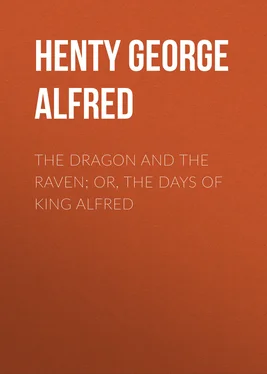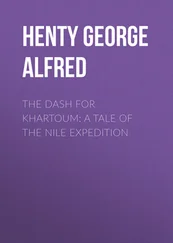George Henty - The Dragon and the Raven; Or, The Days of King Alfred
Здесь есть возможность читать онлайн «George Henty - The Dragon and the Raven; Or, The Days of King Alfred» — ознакомительный отрывок электронной книги совершенно бесплатно, а после прочтения отрывка купить полную версию. В некоторых случаях можно слушать аудио, скачать через торрент в формате fb2 и присутствует краткое содержание. Жанр: Альтернативная история, foreign_antique, foreign_prose, foreign_children, Исторические приключения, на английском языке. Описание произведения, (предисловие) а так же отзывы посетителей доступны на портале библиотеки ЛибКат.
- Название:The Dragon and the Raven; Or, The Days of King Alfred
- Автор:
- Жанр:
- Год:неизвестен
- ISBN:нет данных
- Рейтинг книги:5 / 5. Голосов: 1
-
Избранное:Добавить в избранное
- Отзывы:
-
Ваша оценка:
- 100
- 1
- 2
- 3
- 4
- 5
The Dragon and the Raven; Or, The Days of King Alfred: краткое содержание, описание и аннотация
Предлагаем к чтению аннотацию, описание, краткое содержание или предисловие (зависит от того, что написал сам автор книги «The Dragon and the Raven; Or, The Days of King Alfred»). Если вы не нашли необходимую информацию о книге — напишите в комментариях, мы постараемся отыскать её.
The Dragon and the Raven; Or, The Days of King Alfred — читать онлайн ознакомительный отрывок
Ниже представлен текст книги, разбитый по страницам. Система сохранения места последней прочитанной страницы, позволяет с удобством читать онлайн бесплатно книгу «The Dragon and the Raven; Or, The Days of King Alfred», без необходимости каждый раз заново искать на чём Вы остановились. Поставьте закладку, и сможете в любой момент перейти на страницу, на которой закончили чтение.
Интервал:
Закладка:
"Such has been the rule, Edmund; but seeing the troubled times when Ethelbert came to the throne, it was thought better to unite the two kingdoms under one crown with the understanding that at Ethelbert's death Alfred should succeed him. Their father, Ethelwulf, was a weak king, and should have been born a churchman rather than a prince. He nominally reigned over Wessex, Kent, and Mercia, but the last paid him but a slight allegiance. Alfred was his favourite son, and he sent him, when quite a child, to Rome for a visit. In 855 he himself, with a magnificent retinue, and accompanied by Alfred, visited Rome, travelling through the land of the Franks, and it was there, doubtless, that Alfred acquired that love of learning, and many of those ideas, far in advance of his people, which distinguish him. His mother, Osburgha, died before he and his father started on the pilgrimage. The king was received with much honour by the pope, to whom he presented a gold crown of four pounds weight, ten dishes of the purest gold, a sword richly set in gold, two gold images, some silver-gilt urns, stoles bordered with gold and purple, white silken robes embroidered with figures, and other costly articles of clothing for the celebration of the service of the church, together with rich presents in gold and silver to the churches, bishops, clergy, and other dwellers in Rome. They say that the people of Rome marvelled much at these magnificent gifts from a king of a country which they had considered as barbarous. On his way back he married Judith, daughter of the King of the Franks; a foolish marriage, for the king was far advanced in years and Judith was but a girl.
"Ethelbald, Ethelwulf's eldest son, had acted as regent in his father's absence, and so angered was he at this marriage that he raised his standard of revolt against his father. At her marriage Judith had been crowned queen, and this was contrary to the customs of the West Saxons, therefore Ethelbald was supported by the people of that country; on his father's return to England, however, father and son met, and a division of the kingdom was agreed upon.
"Ethelbald received Wessex, the principal part of the kingdom, and Ethelwulf took Kent, which he had already ruled over in the time of his father Egbert. Ethelwulf died a few months afterwards, leaving Kent to Ethelbert, his second surviving son. The following year, to the horror and indignation of the people of the country, Ethelbald married his stepmother Judith, but two years afterwards died, and Ethelbert, King of Kent, again united Wessex to his own dominions, which consisted of Kent, Surrey, and Sussex. Ethelbert reigned but a short time, and at his death Ethelred, his next brother, ascended the throne. Last year Alfred, the youngest brother, married Elswitha, the daughter of Ethelred Mucil, Earl of the Gaini, in Lincolnshire, whose mother was one of the royal family of Mercia.
"It was but a short time after the marriage that the Danes poured into Mercia from the north. Messengers were sent to ask the assistance of the West Saxons. These at once obeyed the summons, and, joining the Mercians, marched against the Danes, who shut themselves up in the strong city of Nottingham, and were there for some time besieged. The place was strong, the winter at hand, and the time of the soldiers' service nearly expired. A treaty was accordingly made by which the Danes were allowed to depart unharmed to the north side of the Humber, and the West Saxons returned to their kingdom.
"Such is the situation at present, but we may be sure that the Danes will not long remain quiet, but will soon gather for another invasion; ere long, too, we may expect another of their great fleets to arrive somewhere off these coasts, and every Saxon who can bear arms had need take the field to fight for our country and faith against these heathen invaders. Hitherto, Edmund, as you know, I have deeply mourned the death of your mother, and of your sisters who died in infancy; but now I feel that it is for the best, for a terrible time is before us. We men can take refuge in swamp and forest, but it would have been hard for delicate women; and those men are best off who stand alone and are able to give every thought and energy to the defence of their country. 'Tis well that you are now approaching an age when the Saxon youth are wont to take their place in the ranks of battle. I have spared no pains with your training in arms, and though assuredly you lack strength yet to cope in hand-to-hand conflict with these fierce Danes, you may yet take your part in battle, with me on one side of you and Egbert on the other. I have thought over many things of late, and it seems to me that we Saxons have done harm in holding the people of this country as serfs."
"Why, father," Edmund exclaimed in astonishment, "surely you would not have all men free and equal."
"The idea seems strange to you, no doubt, Edmund, and it appears only natural that some men should be born to rule and others to labour, but this might be so even without serfdom, since, as you know, the poorer freemen labour just as do the serfs, only they receive a somewhat larger guerdon for their toil; but had the two races mixed more closely together, had serfdom been abolished and all men been free and capable of bearing arms, we should have been able to show a far better front to the Danes, seeing that the serfs are as three to one to the freemen."
"But the serfs are cowardly and spiritless," Edmund said; "they are not of a fighting race, and fell almost without resistance before our ancestors when they landed here."
"Their race is no doubt inferior to our own, Edmund," his father said, "seeing that they are neither so tall nor so strong as we Saxons, but of old they were not deficient in bravery, for they fought as stoutly against the Romans as did our own hardy ancestors. After having been for hundreds of years subject to the Roman yoke, and having no occasion to use arms, they lost their manly virtues, and when the Romans left them were an easy prey for the first comer. Our fathers could not foresee that the time would come when they too in turn would be invaded. Had they done so, methinks they would not have set up so broad a line of separation between themselves and the Britons, but would have admitted the latter to the rights of citizenship, in which case intermarriage would have taken place freely, and the whole people would have become amalgamated. The Britons, accustomed to our free institutions, and taking part in the wars between the various Saxon kingdoms, would have recovered their warlike virtues, and it would be as one people that we should resist the Danes. As it is, the serfs, who form by far the largest part of the population, are apathetic and cowardly; they view the struggle with indifference, for what signifies to them whether Dane or Saxon conquer; they have no interest in the struggle, nothing to lose or to gain, it is but a change of masters."
Edmund was silent. The very possibility of a state of things in which there should be no serfs, and when all men should be free and equal, had never occurred to him; but he had a deep respect for his father, who bore indeed the reputation of being one of the wisest and most clear-headed of the nobles of East Anglia, and it seemed to him that this strange and novel doctrine contained much truth in it. Still the idea was as strange to him as it would have been to the son of a southern planter in America half a century ago. The existence of slaves seemed as much a matter of course as that of horses or dogs, and although he had been accustomed to see from time to time freedom bestowed upon some favourite serf as a special reward for services, the thought of a general liberation of the slaves was strange and almost bewildering, and he lay awake puzzling over the problem long after his father and kinsman had fallen asleep.
CHAPTER II: THE BATTLE OF KESTEVEN
Интервал:
Закладка:
Похожие книги на «The Dragon and the Raven; Or, The Days of King Alfred»
Представляем Вашему вниманию похожие книги на «The Dragon and the Raven; Or, The Days of King Alfred» списком для выбора. Мы отобрали схожую по названию и смыслу литературу в надежде предоставить читателям больше вариантов отыскать новые, интересные, ещё непрочитанные произведения.
Обсуждение, отзывы о книге «The Dragon and the Raven; Or, The Days of King Alfred» и просто собственные мнения читателей. Оставьте ваши комментарии, напишите, что Вы думаете о произведении, его смысле или главных героях. Укажите что конкретно понравилось, а что нет, и почему Вы так считаете.












